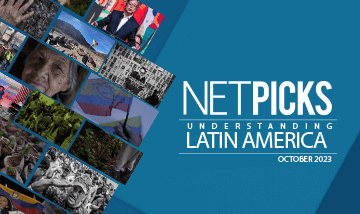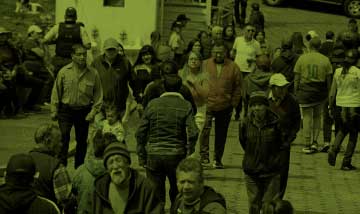Understanding Latin America
Every month we trawl the web for in-depth analysis, research summaries and opinions we think particularly worth reading, and that you won’t find in the mainstream media.
This month we bring you five articles: from El Salvador,newly elected President Nayib Bukele provoked severe criticism by entering the National Assembly accompanied by armed members of the military; from Venezuela,where the opposition finds itself seriously split over whether to participate in or boycott the upcoming legislative elections;from Cuba, where women find themselves unequally impacted by another ‘Special Period’ of the Cuban economy;from Nicaragua, where the 2018 protests have led many previously supportive young people to abandon Daniel Ortega’s ruling party;and from Brazil, where trans people are being killed and assaulted in alarming numbers; President Bolsonaro’s policies only are exacerbating the problem.
EL BUKELAZO: SHADES OF DICTATORSHIP IN EL SALVADOR
Nayib Bukele, once a member of the left wing Frente Farabundo Marti para la Liberación Nacional, FMLN, was elected President of El Salvador in 2019 on an independent, anti-corruption platform. His cool, post ideological style also appealed to those dissatisfied with the lack of progress since the 1992 Peace Accords ended a 12-year civil war. However, barely six months into his mandate, Bukele has provoked a major reaction by entering a special session of the Assembly surrounded by armed military personnel. The majority of the opposition boycotted the session, only 28 of 84 legislators attending. Bukele, occupying the Assembly President’s chair, and praying to god, stated: “Now I think it’s quite clear who has control of the situation.” The reaction was swift and highly critical on all sides, and Bukele appears to have backed off to some degree, stating that he invited the military in order to avoid a popular uprising. His approval ratings remained high just before the event, and, backed by OAS President Luis Almagro, he has accused the debilitated FMLN of supporting Maduro in Venezuela, and the right wing ARENA party, not without substance, of being involved with criminal gangs at home. Social movements have strongly criticized Bukele’s actions, including his violation of the secular State, while urging the legislature to implement long delayed social policies that go beyond internal security.
Hilary Goodfriend, 19th February, 2020.
https://nacla.org/news/2020/02/19/el-bukelazo-shades-dictatorship-el-salvador
VENEZUELA’S OPPOSITION AT A CROSSROADS
Legislative elections will be held this year in Venezuela, but the opposition is fragmented and unless it finds a way to unite will almost certain lose its power base in the National Assembly. In the most extreme case the opposition could even boycott the elections, thus handing the Maduro government complete control of the country, including the Electoral Council and the Supreme Court. The opposition, comprised of factions that run from US interventionists to dissatisfied chavistas, has held power in the Congress since 2015 when it won a total of 112 of the 167 seats. However, it now appears to be almost irremediably splintered. The radical group of Leopold Lopez and María Corina Machado holds few seats but a large amount of media power, and is determined to boycott. While the recent meeting between Donald Trump and Juan Guaidó has given them a boost, their radical interventionist stance has yielded little, and may even convince some to return to the Chavista fold. Social democratic elements more amenable to negotiation find their power curtailed by US pressure, while the Party of Henry Capriles, who came within 2% of winning the Presidential elections in 2013, could split, given Capriles demand that the opposition participate. If the opposition unites and participates, this could open up the possibility of negotiation with Maduro. A full or partial boycott seems more likely however, and could lead to loss of power and even to a type of Cuban style boycott by the US, and the consequent entrenchment of the Maduro Presidency.
Ociel Alí López, 22nd February, 2020.
https://nacla.org/news/2020/02/23/venezuela%E2%80%99s-opposition-crossroads-disponible-en-espa%C3%B1ol
ARE THE WOMEN OF CUBA FACING ANOTHER FEMINISED SPECIAL PERIOD
Women in Cuba were particularly hard hit by the collapse of the Soviet Union and the ensuing ‘Special Period’ from 1990 and 1994, in which the country’s economy contracted by thirty eight percent. The present situation on the Island is now being compared to that difficult time due to the collapse of support from Venezuela, the end of the medical program in Brazil, and the ratcheting up of sanctions by US president Donald Trump. Despite predicted growth in GDP of 1% in 2020, shortages of basic food stuffs are now being experienced. Cuba is no longer able to import two-thirds of its food, and given that chicken and pig feed is also imported, rationing of eggs and pork, amongst other items, has led women to spend increasing amounts of time queuing or negotiating on the black market. And although the presence of women in the workforce has escalated significantly since the revolution, with ninety per cent of women working in the public sector as of 2010, the domestic environment has not reflected these changes; women consequently still bear a disproportionate responsibility for providing food. An average state salary of around US$44 also makes secondary work almost a necessity. While structural changes to the economy could remedy the situation, these seem unlikely in the present context of external debt, limited hard currency and an aggressive Trump White House.
Daliany Kersh, February 2nd, 2020.
https://blogs.lse.ac.uk/latamcaribbean/2020/02/20/are-the-women-of-cuba-facing-another-feminised-special-period/
THE ANTI-SANDINISTA YOUTH OF NICARAGUA
When the dictatorial Somosa regime fell to Daniel Ortega and the Frente Sandinista de Liberación Nacional, FSLN, in 1979, sixty-seven percent of the country’s population was under 24. Since that time the FSLN has been able to count on the support of many young people, who today still form a major portion of the population. But for many, the protests of 2018 in Nicaragua marked a turning point. Most of the victims were under 25, and for those who grew up in Sandinista families but with no memory of the violence of the 1980’s, the violence of the repression turned them against President Daniel Ortega. His government, in power since 2006, has employed organized youth groups that once promoted literacy and harvested coffee, in the control of the population and even against the 2018 protestors. In a radical shift from the previous era, much of the population now sees these groups as solely associated with violence and corruption. While alternatives to the ‘Sandinismo’ of the FSLN have attracted little support, the Asociación de Madres de Abril, AMA, responsible for an extremely popular exhibition representing the victims of the 2018 protests, has become a focal point for non-violent protest against the brutality and impunity of the Ortega regime.
Chris Jillson. February 5th, 2020.
https://nacla.org/news/2020/02/05/anti-sandinista-youth-nicaragua
AT LEAST 124 TRANS PEOPLE KILLED IN BRAZIL IN 2019: REPORT
A recent report by the National Association of Travestis and Trans People, Antra, tells of 124 cases of the murder of trans people in Brazil in 2019, eighty percent of whom showed signs of torture. While this figure is slightly down on the previous year, according to the report, it is still double that of Mexico, the country with the second highest figures. Disturbingly, numbers for January of this year show an increase of 180 percent on 2019, while assaults also increased dramatically (800%) in that year: 80% of murder victims were black and 97.7 % were trans women. The figures may even be under reported say the authors of the report, as the State lacks the tools for monitoring the murder of trans people. Part of the problem is that the authorities do little to resolve the issue: the police only identified suspects in eight percent of cases, while attitude of the Bolsonaro government towards minorities, in particular trans people, is also having an effect. Some of the cases included in the report were of travestis murdered while their killers shouted “Bolsonaro.”
Lu Sudré, 30th January 2020.
https://www.brasildefato.com.br/2020/01/30/at-least-124-trans-people-killed-in-brazil-in-2019-report




